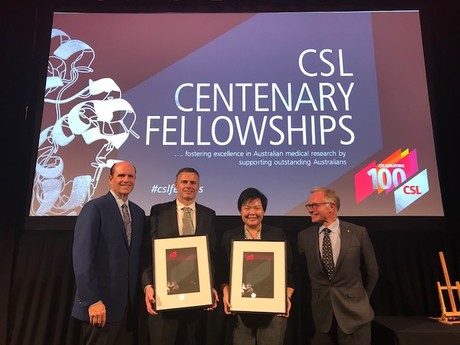$2.5m funding for research into new immune therapies and complications of stroke

Two Australian scientists have each been awarded an AU$1.25 million, five-year CSL Centenary Fellowship to further research into why so many people die from infection following stroke and how we might develop better vaccines against diseases such as tuberculosis.
Dr Connie Wong and Dr Daniel Pellicci will be funded through the $25 million CSL Centenary Fellowships program, which was established in 2016 to support mid-career Australian scientists to pursue world-class medical research.
Dr Connie Wong from Monash University’s Centre for Inflammatory Diseases wants to understand why as many as one-fifth of deaths following stroke are caused by pneumonia and other infections.
Dr Wong and her team have discovered that stroke not only damages the brain but weakens the immune system and allows bacteria in the gut to escape and cause infection in other parts of the body. The Fellowship will enable Dr Wong to investigate how the brain communicates with the immune system as well as researching new strategies to restore the gut barrier’s integrity following stroke. “I hope that in five years’ time I will have made a difference in how patients with stroke are treated, found new ways of stopping infection and developed therapies to wake up the immune system without damaging effects,” Dr Wong said.
Dr Daniel Pellicci from the Peter Doherty Institute for Infection and Immunity at the University of Melbourne, and Murdoch Children’s Research Institute wants to recruit specialist white blood cells, known as ‘unconventional T-cells’ in the fight against tuberculosis (TB).
‘Unconventional T-cells’ are among the immune system’s first responders. They can kill infected cells and recruit other parts of the immune system to destroy the attackers. Until now, these cells have been difficult to study but Dr Pellicci has developed investigative tools to uncover the basic biology of how these cells work in the immune system.
Pellicci will use his Fellowship to focus on people suffering from tuberculosis. He hopes his work will lead the way to an improved TB vaccine as well as other new immune therapies. “In the longer term, I think we’ll be able to develop potent lipid molecules to stimulate these cells to help fight various infectious diseases, plus other diseases that involve the immune system such as cancer, autoimmunity and allergies,” Dr Pellicci said.
CSL Chief Scientific Officer Dr Andrew Cuthbertson said, “The Fellows are a group of exceptionally bright young Australians, each with decades of research ahead of them, and who will become some of Australia’s pre-eminent scientists. We look forward to following their careers as they in turn lead and mentor a new generation of promising medical researchers.”
Optics11 Life appoints Jacquelien ten Dam as CEO
Optics11 Life plans to accelerate its commercial growth in key markets while building strategic...
Epilepsy pioneer elected President of Aust Academy of Science
Laureate Professor Sam Berkovic — one of the world's most respected neurologists...
CSIRO announces 300+ job cuts as part of restructure
CSIRO will need to reduce roles in its Research Units by 300–350 full-time equivalent staff...





